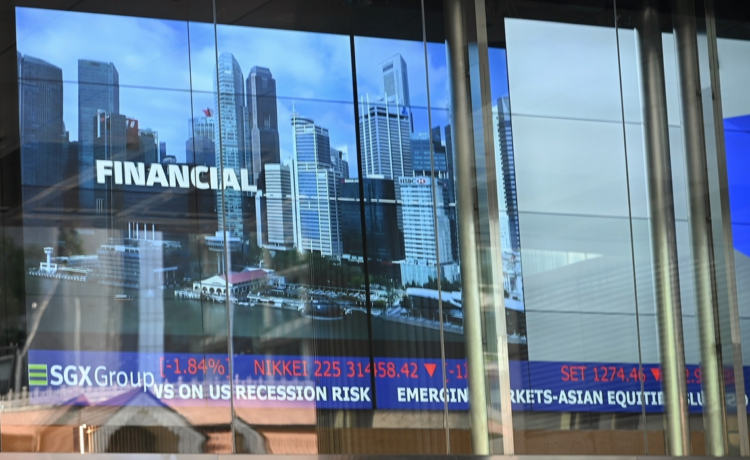London – London has slipped out of the world’s top 20 initial public offering (IPO) markets as the third quarter of 2025 ends, overtaken by Singapore and Mexico in a fresh blow to its standing as a global finance hub.
The UK exchange has slipped three places to 23rd in a Bloomberg ranking of the world’s busiest IPO destinations, placing it behind the frontier market of Oman. Volume this year dropped 69 per cent to US$248 million (S$320 million), the weakest haul in more than 35 years.
Other markets are in the ascendancy. Singapore jumped to 9th place with US$1.44 billion raised, driven by property trust listings. Mexico ranks as the 19th-busiest listing venue this year with US$460 million of deals, nearly double London’s volume. Both recorded little or no activity in 2024.
The largest London IPO in 2025 – an April offering from accountancy MHA – raised £98 million (S$170 million). No deals have involved a major Wall Street bank; they were instead arranged by small local outfits like Cavendish and Singer Capital Markets. The third-quarter picture is even starker with just US$42 million of deal volume, down 85 per cent from the same period last year, according to data compiled by Bloomberg.
London’s centuries-old role as an international financial centre has been eroded by competition from European rivals and rising hubs in Asia and the Middle East. Lower valuations have fueled an exodus of companies to private buyers or New York’s deeper capital markets. That’s diminished London’s importance from the days when it was regularly one of the world’s biggest IPO players.
“When valuations are low, private owners hesitate to IPO at a discount, while listed firms become takeover targets instead,” said Leonard Keller, a portfolio manager at Berenberg. “The UK has interesting companies, but London’s valuation discount can be an entry point for private equity.”
The numbers show how swiftly London’s fortunes have fallen over less than two decades. In 2006, fundraising peaked at an all-time high of US$51 billion with listings from Scottish insurance giant Standard Life, department store owner Debenhams and Russian oil major Rosneft. This year’s total is down 99 per cent from the same period in 2006.
As recently as 2013, UK IPOs accounted for more than half of the European fundraising total. That share has dwindled to 3 per cent this year, according to data compiled by Bloomberg.
Barney Hussey-Yeo, chief executive officer of British fintech start-up Cleo AI, said the lack of London IPOs will have a ripple effect leading to less talent, tax revenue and wealth creation in the UK.
“When you speak to the successful founders in Europe, they’d tell you that the London Stock Exchange is not fit for purpose,” Mr Hussey-Yeo said.
As fewer large companies go public in Europe, the region’s stock exchanges are fighting harder to win the biggest listings. London was competing with Stockholm, Amsterdam and Zurich to host Hellman & Friedman’s IPO of alarm company Verisure, which is targeting to raise more than €3 billion (S$4.5 billion). It ultimately lost out to the Swedish capital.
The pool of UK-listed firms continues to decline as private equity funds snap up undervalued companies. KKR & Co. has made takeover approaches to at least three companies on the London market in 2025. Bain Capital, Blackstone., Brookfield, ICG, Macquarie Asset Management, Permira, Stonepeak Partners and Warburg Pincus have also pursued deals in recent months.
“Private equity is taking companies off the market, but they’re not then bringing them back when they work their magic on them,” said Rupert Soames, who chairs the Confederation of British Industry. “The fact is, there’s been a net loss.”
UK authorities have rolled out reforms to reinvigorate the public markets. Those include relaxing rules around dual-class share structures, making it easier to raise additional funds and loosening guidance around executive pay. FTSE Russell, which compiles the blue chip FTSE 100 index, last week started allowing stocks not trading in British pounds to be included in UK indexes and lowered the bar for firms to fast-track into the indexes after IPOs.
London Stock Exchange (LSE) chief executive Julia Hoggett has pledged to boost London’s junior AIM market and is pushing a new venue for investors to trade shares of private companies.
A spokesperson for the LSE said it’s encouraged by the pipeline of companies looking to IPO in the coming months. They added that IPOs aren’t the only indicator of the health of the UK capital markets, with activity in follow-on offerings remaining strong.
The bigger boost could come in 2026. Software firm Visma, which was last valued at €19 billion, has provisionally picked London for a 2026 float that could rank as the market’s biggest IPO in years, Bloomberg News has reported. British travel agent Loveholidays and Uzbek gold miner Navoi Mining & Metallurgical are also planning London listings, people with knowledge of the matter have said.
But for now, rival European venues have stronger pipelines of upcoming listings, and the United States remains the preferred IPO venue due to its higher valuations and more receptive investor base, according to Valeriya Vitkova, senior lecturer at the Bayes Business School in London.
The UK stamp duty on stock trades and British funds’ low allocation to local equities are among factors dragging down the market, the CBI’s Mr Soames said. Still, he expressed confidence that rule changes could help turn things around.
“There is huge momentum now about getting reform to regulation,” Mr Soames said. “London is still preeminent, so don’t give up hope.” BLOOMBERG



